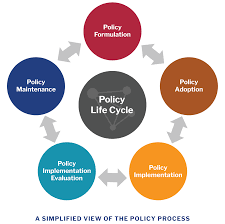
Navigating the Complexities of Modern Policy Landscape
The Impact of Policy on Society
Policy plays a crucial role in shaping the fabric of society. From government regulations to organizational guidelines, policies set the framework within which individuals and institutions operate. The decisions made in policy formulation have far-reaching consequences that can influence various aspects of our lives.
Public Policy and Governance
Public policy, in particular, is instrumental in defining the relationship between the government and its citizens. It outlines the rules and procedures that govern public services, resource allocation, and societal welfare programs. Effective public policy ensures equitable distribution of resources, promotes social justice, and upholds democratic values.
Economic Policy and Development
Economic policies dictate fiscal measures, monetary strategies, and trade regulations that impact economic growth and stability. Sound economic policies can stimulate investment, create employment opportunities, and foster innovation. Conversely, poor economic policies may lead to inflation, unemployment, or financial crises.
Social Policy and Well-being
Social policies address issues related to healthcare, education, housing, and welfare support. These policies aim to enhance the quality of life for individuals and communities by ensuring access to essential services and promoting social inclusion. Well-crafted social policies contribute to a healthier, more educated society.
Environmental Policy and Sustainability
Environmental policies focus on preserving natural resources, mitigating climate change effects, and promoting sustainable practices. These policies are critical for safeguarding ecosystems, reducing pollution levels, and combating environmental degradation. Implementing effective environmental policies is vital for ensuring a habitable planet for future generations.
In conclusion, policy serves as a mechanism for enacting change and addressing societal challenges. By formulating well-informed policies that prioritize the common good, we can create a more just, prosperous, and sustainable world for all.
Understanding Public Policy: Key Questions Answered
- What is public policy?
- How are policies created and implemented?
- What is the role of government in shaping policy?
- How do policies impact the economy?
- What are the key factors influencing policy decisions?
What is public policy?
Public policy refers to the set of decisions, actions, and guidelines established by governmental bodies to address public issues and shape the functioning of society. It encompasses a wide range of regulations, laws, and programs designed to achieve specific goals related to public welfare, economic stability, social justice, and governance. Public policy plays a pivotal role in determining how resources are allocated, services are delivered, and societal problems are addressed. It serves as a framework for decision-making processes that influence the well-being of individuals, communities, and the overall functioning of a country. Understanding public policy is essential for comprehending how governments interact with their citizens and how policies impact various aspects of our daily lives.
How are policies created and implemented?
Policies are typically created through a systematic process that involves research, analysis, consultation, and decision-making by relevant stakeholders. The initial stages often involve identifying a specific issue or problem that requires policy intervention. This is followed by research to gather data, assess potential solutions, and evaluate the feasibility and implications of different policy options. Stakeholder input, including feedback from experts, interest groups, and the public, is crucial in shaping policy proposals. Once a policy is formulated and approved, it undergoes implementation through various mechanisms such as legislation, regulations, or administrative directives. Implementation involves putting the policy into action, allocating resources, monitoring progress, and adjusting strategies as needed to achieve the desired outcomes. Effective communication, coordination among agencies, and ongoing evaluation are essential for successful policy implementation and impact assessment.
What is the role of government in shaping policy?
The role of government in shaping policy is pivotal in establishing the regulatory framework that guides societal functions and addresses public needs. Governments are responsible for formulating, implementing, and enforcing policies that impact various aspects of citizens’ lives, ranging from healthcare and education to economic development and environmental protection. Through legislative processes, executive actions, and regulatory interventions, governments set the direction for social progress, economic stability, and environmental sustainability. By engaging with stakeholders, conducting research, and considering public input, governments play a crucial role in balancing competing interests and advancing the collective well-being of society through effective policy-making.
How do policies impact the economy?
Policies have a significant impact on the economy by influencing various aspects of financial and business activities. Economic policies, such as fiscal and monetary measures, trade regulations, and tax policies, can either stimulate or hinder economic growth. For instance, government spending decisions can boost demand for goods and services, leading to increased production and job creation. Similarly, monetary policies set by central banks affect interest rates and money supply, which in turn influence investment levels and inflation rates. Overall, well-crafted policies that promote stability, innovation, and market efficiency are essential for fostering a thriving economy.
What are the key factors influencing policy decisions?
Policy decisions are influenced by a myriad of key factors that shape the decision-making process. These factors include political dynamics, economic considerations, social values, technological advancements, and environmental concerns. Political dynamics play a significant role as policymakers navigate competing interests, partisan agendas, and public opinion. Economic factors such as budget constraints, resource availability, and market conditions often dictate the feasibility of policy options. Social values and cultural norms also influence policy decisions by reflecting societal preferences and ethical considerations. Furthermore, technological advancements and environmental considerations increasingly impact policy choices in the modern world, driving innovation and sustainability efforts. Overall, the interplay of these diverse factors underscores the complexity of policymaking and highlights the need for comprehensive analysis and stakeholder engagement in shaping effective policies.









-
Tagged attention spans, breaks, communication, currency, digital world